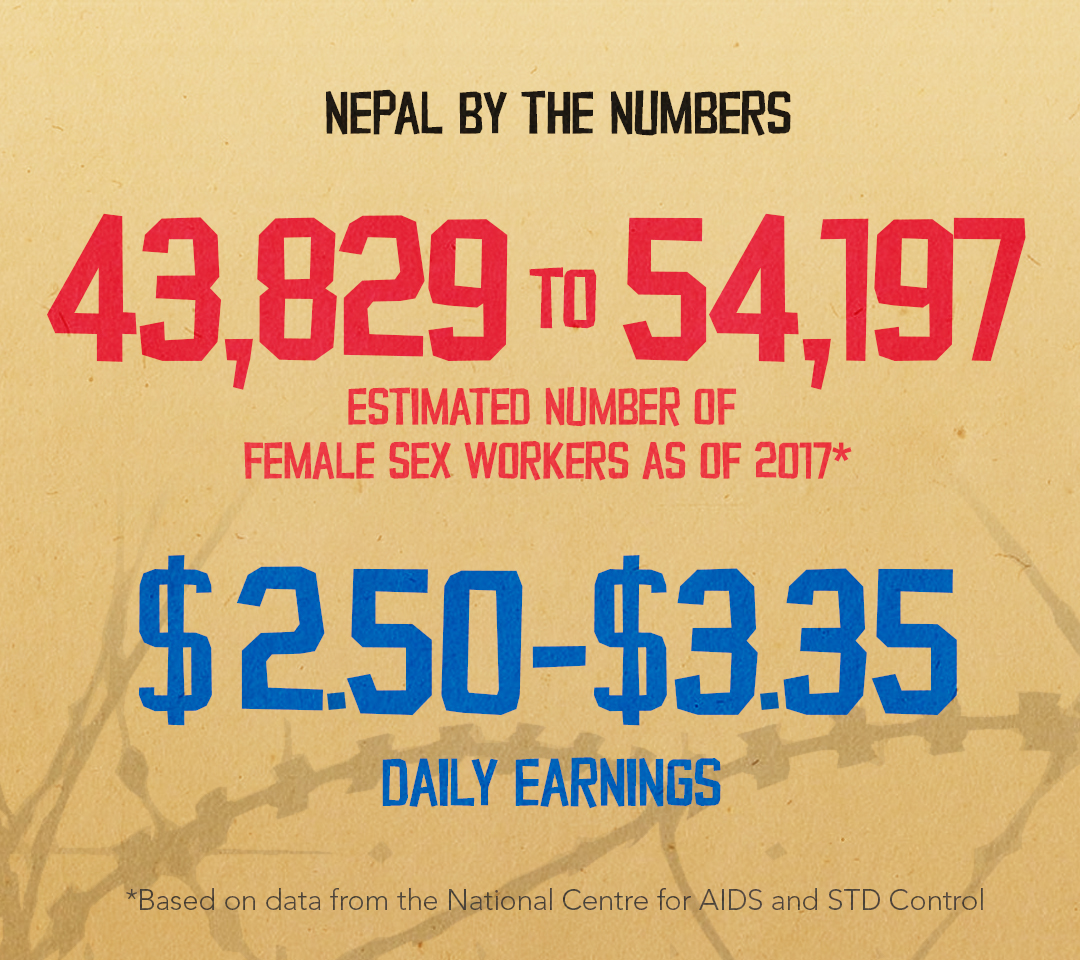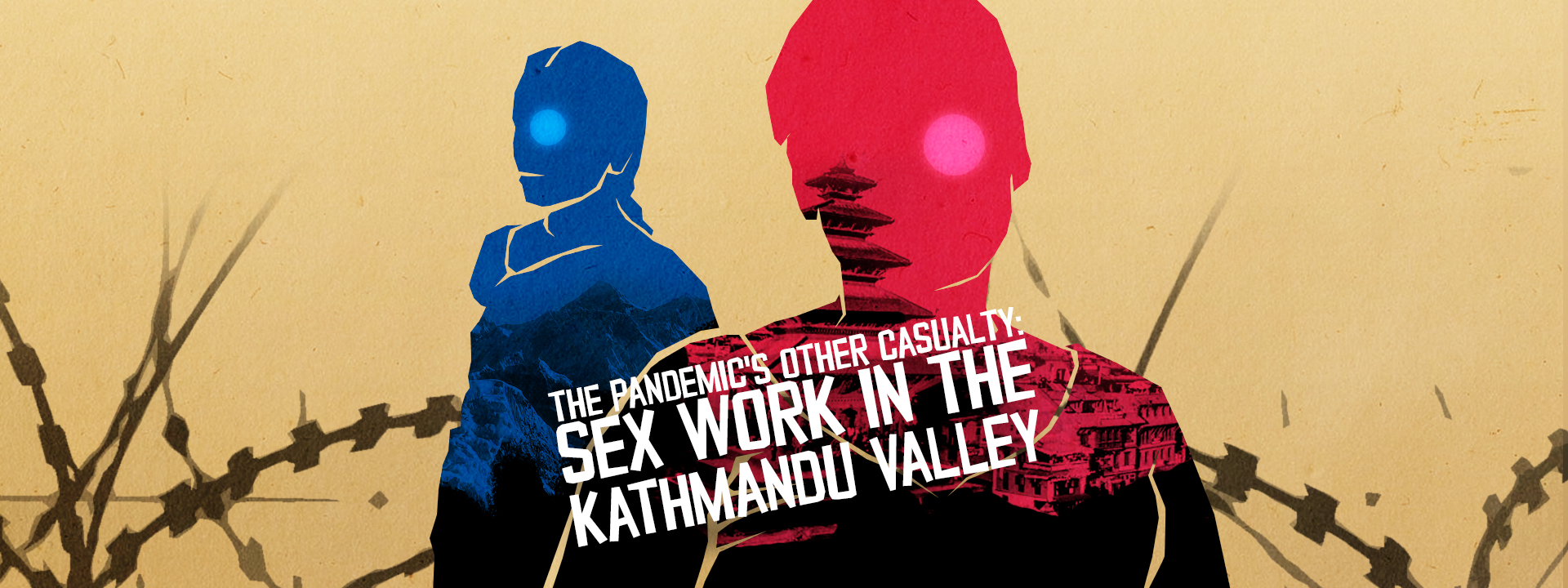On July 21, after nearly months under quarantine, the government of Nepal finally lifted its lockdown.
Though signages still littered the city and constant messages still came in from Nepal Tellicome — a reminder that while the “lockdown has been lifted, the new coronavirus is still here so people should remain responsible and observe all precautionary health measures” — Kathmandu, Nepal’s capital, roared to life, its streets busier than ever before.
Less than a month later, however, after witnessing a spike in COVID-19 cases, the government reinstated a 15-day lockdown on Aug. 9. Meanwhile, in a bid to adapt to the ambiguous, amorphous notion of the new normal, Nepal’s working class has slowly migrated online, where possible.
Staying inside and working from home keeps them out of the virus’s warpath. But not all kinds of work are recognized and celebrated as work, and neither has everyone had the privilege of working from home. Sex workers, whose trade deals in physical intimacy, are particularly punished by the COVID-19 pandemic. They have no choice but to show up and put themselves in harm’s way.
Difficulties and distress
“First, there is no work because … fewer people are staying in the valley right now and the police are [more] proactive,” says Nagama, a 48-year-old sex worker in Nepal. One day, she was detained by authorities and was kept in custody for some five hours. “That day, I already lost the hope that I [could] earn three or four hundred Nepalese rupees (US$2.50 to US$3.35).”
Nagama did not start out in the sex industry. Five years ago, around the time of her divorce, she was working as a porter. But she figured in an accident and, as a result, could no longer lift heavy weights. She turned to sex work to keep herself afloat. Today, she’s working to support her 19-year-old daughter, who herself has recently had a divorce, forcing her to move back in with her mother.
But work is hard to come by. Rooms available for rent are rarer these days, Nagama says, adding that her prospective clients are strapped for cash as well, and are unwilling to book rooms for them. She’s getting old, too, she adds. Her body isn’t quite as attractive as it used to be — and as she needs it to be.
The widespread individual narratives of the sex workers reflect the economic concerns, poor living conditions, and mounting mental health issues. “Even though the lockdown was lifted on July 21 by the government,” Nagama says, “the restrictions that our work has been facing for ages have not been lifted yet.”
A shared experience
Nagama is just one of tens of thousands of female sex workers in Nepal, estimated at between 43,829 and 54,197 as of 2017, according to the National Centre for AIDS and STD Control. Her story is more of a shared experience than an isolated case. While the issues of deprived living, poor working conditions, and lack of work are common across the class and gender strata, there are several problems specific to certain genders, regions, and body types.
Rabia is a 26-year-old transgender woman. She has worked much of her life — first in a massage parlor in the Thamel area, near central Kathmandu, then as a hairstylist, before entering sex work — so she could undergo gender-affirming surgery. She had finally saved enough and, right before the pandemic hit, she went for it.
Now, eight months later, Rabia is without savings, without a job, and without much of a choice. “I am scared that [I won’t] have any option other than to do sex work again,” she says, admitting that it’s something she doesn’t want to involve herself in anymore. “It’s even difficult to pay the room rent these days,” she laments.
Agni is another transgender sex worker. She adds that while they have always carried a heavier burden of stigma, the pandemic has made things worse.
The kirana pssal (provisional store) nearby Agni’s house has discontinued providing for her daily needs, saying “kati manche sang ho… khahi ki…(we do not know how many people you have slept with).” Agni was branded as a possible hyper spreader of COVID-19.
Another problem that transgender sex workers face is the non-availability of essential medical facilities and supplies, such as hormones that they need to take. Beauty products, which are essential for their job, have also become inaccessible and unaffordable, Agni said.

Not all kinds of work are celebrated as work, and neither does everyone have the privilege of working from home. Sex workers, whose trade deals in physical intimacy, are particularly punished by the COVID-19 pandemic.

Privacy problems
The pandemic has bared in the ugliest ways the threats to personal privacy that sex workers have to deal with. Beena is a 17-year-old sex worker who somewhat leads a double-life. “Before the pandemic, we had been telling our families that we’ve been working at the parlor and at shopping malls,” she says, speaking in behalf of her colleagues.
Her parents don’t know about their sex work, and when the country had gone under lockdown, their families urged them to ask the sahuji (shop owners) to loan them money. “It has become hard to make them understand,” Beena says.
The digital migration has only served to make her situation worse. The thrust to move work online has not only left sex workers behind, but it has also introduced a new set of challenges for them.
On a very basic level, access already sets a high barrier to entry, especially for those who can’t afford devices, equipment, and a stable and decent internet connection. The worldwide web also brings with it the need to understand digital rights, cybercrime, and electronic privacy, all for the protection of users.
These issues are not discussed widely enough, so sometimes the victims of online violence victimize themselves.
Before the pandemic, Bimla, a 22-year-old sex worker, would be contacted by brokers through the phone, and she would respond to clients that way. She would earn less, because the brokers took a cut, but she still agrees that online work comes with far greater risk than offline transactions.
“I have the online tools [such] as Wi-fi and multimedia mobiles,” she says, adding that because she finished school until the 9th grade, she also knows how to write in Roman Nepali. Because of these, finding and engaging with clients wasn’t much of a hurdle for her.
“But I do not know whether or not it is safe,” Bimla says. “I get scared sometimes. What if the clients are recording the video call and later put it on any porn site?”

“I have the online tools [such as] Wi-Fi and multimedia mobiles. But I do not know whether or not it is safe.”

Under the pandemic and due to the criminalization and taboo attached to their work, sex workers suffer from a unique set of challenges, said Shova Dangol, chairperson of the Nari Chetana Samaj Nepal or SWAN (Society for Women Awareness Nepal).
Everyone – from stakeholders and civil society to government leaders – knows sex workers exist. But because stigma is potent, their plight is almost never discussed, and their most basic rights are denied. Questions of whether or not they entered into this line of work by choice are immaterial. They, too, need support.●
Kavita Raturi is a freelance writer based in Kathmandu. She has a doctorate from the Gender Studies Department of JNU, and her areas of interest include gender, women, and migration. She is a keen observer of politics and society in Nepal. Her articles appear in journals in Nepal and India.
















